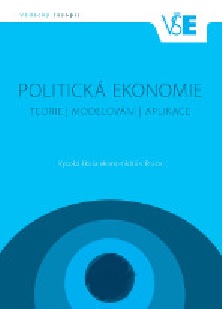Cenová konvergence zemí Evropské unie od východního rozšíření a její dopady na Českou republiku
Price Convergence of the EU Countries since the Eastern Enlargement and its Impacts on the Czech Republic
Author(s): Martin Gorčák, Stanislav Šaroch, Josef BičSubject(s): National Economy, EU-Approach / EU-Accession / EU-Development, Fiscal Politics / Budgeting
Published by: Vysoká škola ekonomická v Praze
Keywords: Balassa-Samuelson effect; comparative price level; GDP per capita; inflation; tradables; labour productivity
Summary/Abstract: The article examines the factors of convergence of price levels among European countries, even regarding the time lag since previous research on the Czech Republic's accession to the EU. In addition to the factors included in the Balassa-Samuelson model, it has been found that certain structural factors contribute to price convergence, as could be expected especially in the transition economies after accessing the EU in 2004. It has also been confirmed that in the context of liberalization of the economies in Central and Eastern Europe, the enlarged internal market and harmonization from the EU level, it is not possible to clearly distinguish between "tradable" and "non-tradable" sectors. Contrary to expectations, however, it has been questioned that due to price deregulation in the Czech Republic, reduced price deviation would be reported for goods with regulated prices so the threat of Baumol's disease is still seen in this context. It is also relevant for the context of European integration that it is possible to doubt the risk of price jumps in the Czech Republic after the adoption of the euro, regarding the examination of the price convergence factors.
Journal: Politická ekonomie
- Issue Year: 69/2021
- Issue No: 4
- Page Range: 393-412
- Page Count: 20
- Language: Czech

